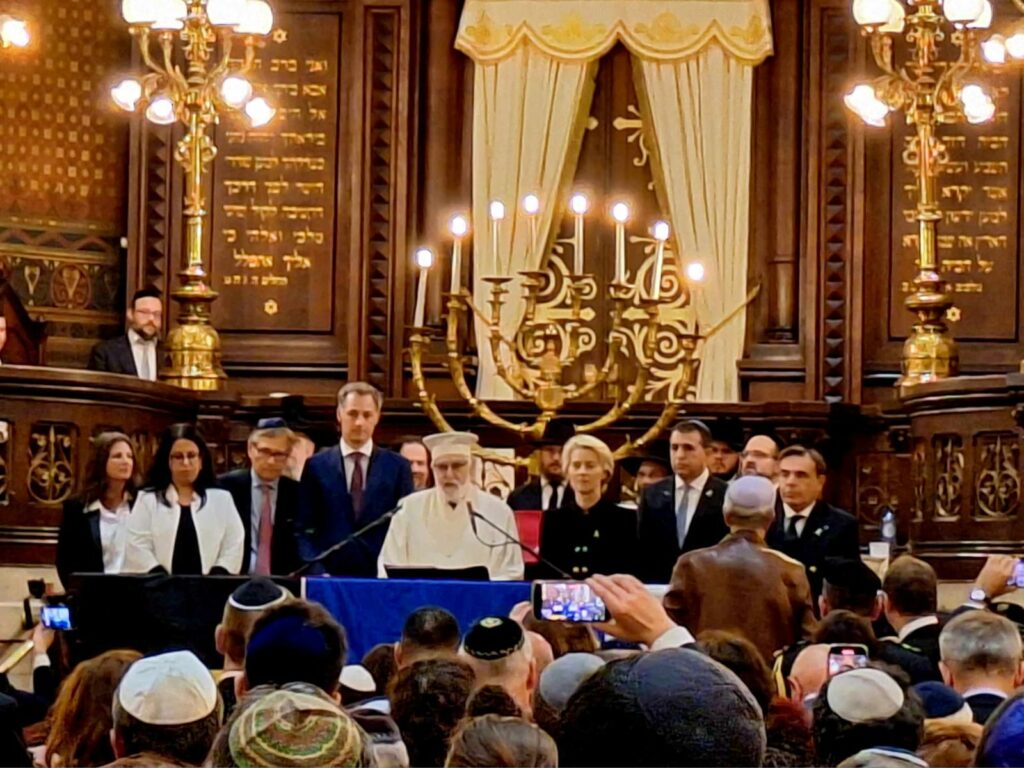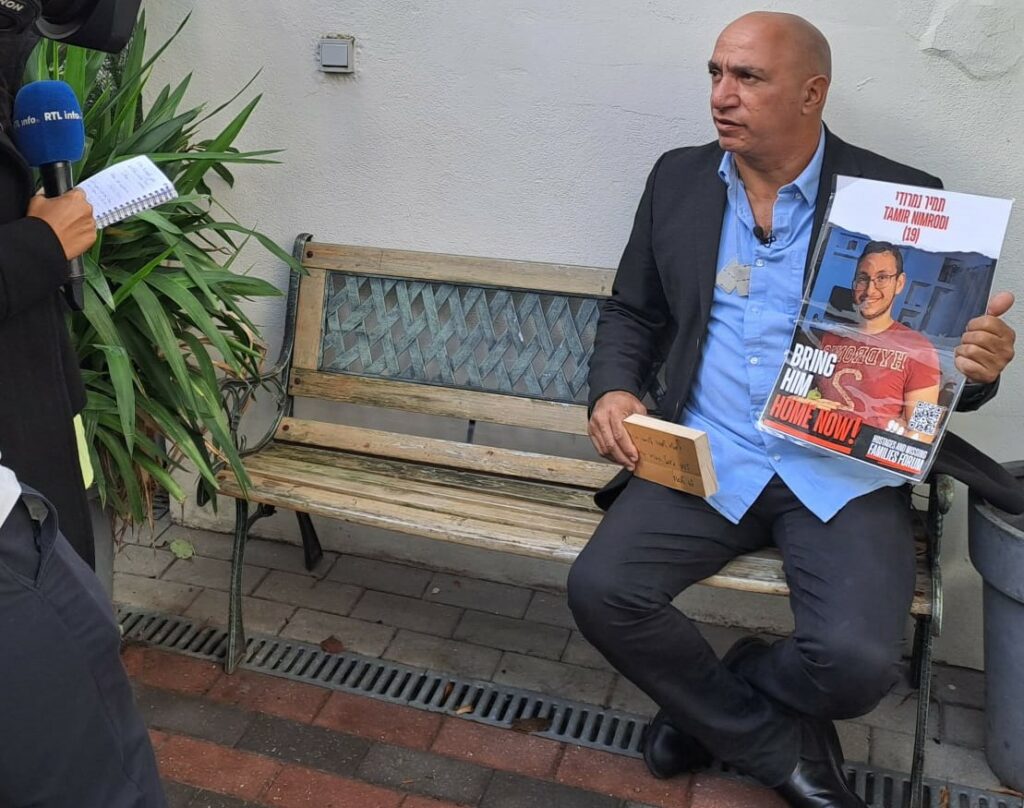The father of one of the hostages taken to Gaza by Hamas on 7 October 2023 visited Brussels on Monday to urge the EU and its Member States to step up its efforts to bring about the release of the remaining hostages there.
Tamir Nimrodi, 18, was abducted by Hamas in the early morning hours on 7 October a year ago when he served as a non-combatting soldier engaged in education at the Erez crossing to Gaza. He was not supposed to be there but volunteered instead of a friend who asked for his help. Besides the horrifying videos published by Hamas on the same day, his father has not heard anything about his son since then.
“I hope and believe he’s alive,” Alon Nimrodi told journalists at a briefing on Monday. He read from a paper found at the base where Tamir had written about his ambition to help other people and prevent anyone from being hurt. Since the terrible day, Alon quit his job and has devoted all his time to influence the public opinion in Israel and abroad to bring his son and the other hostages home.
“What else can I do? I have to shout. Every day counts,” he says. After one year, about half of the remaining 101 hostages are believed to be dead. Two friends of Tamir were taken with him but have been found killed in captivity.
Military pressure until now has had the opposite effect on Hamas and endangered the lives of the hostages. With the current focus on the war against Hezbollah in Lebanon, the families of the hostages fear that a hostage deal with Hamas is not a top priority of the Israeli government, if it ever was. But Alon Nimrodi has not lost hope and believe that a solution can be found.
He thinks that EU can do more and has an obligation to help Israel to free the hostages as many of them have dual citizenship. Turkey for example, a NATO member and candidate country, is supportive of Hamas. But that is also a reason why it could help if the EU would use its leverage on Turkey to act as an honest broker and mediator.
Asked if he had met the Israeli Prime Minister, Nimrodi replied that that he had met him 10 months ago but did not elaborate about the failed ceasefire – hostage talks. A deal was possible a few months ago but the talks collapsed when Netanyahu raised new conditions pressured by his extremist coalition partners.
In Brussels he also met EU officials and spoke at a ceremony at the Great Synagogue in the city, in the presence of European Commission President Ursula von der Leyen and other Commissioners.

European Commission President Ursula von der Leyen and Belgian Prime Minister Alexander De Croo took part in a commemoration ceremony at the Great Synagogue of Europe in Brussels, 7 October, credit: The Brussels Times
EU statements on 7 October
Both von der Leyen and High Representative Josep Borrell issued statements on 7 October, amid the escalation of the war on all fronts and on the brink of a full-scale war with Iran which until now has acted via its proxies. While both statements are similar and call for an immediate ceasefire, they have not been coordinated and differ in tone and emphasis.
Von der Leyen writes that “there can be no justification for Hamas' acts of terror. I condemn once again, and in the strongest possible terms, those barbarous attacks”.
“They brought immense suffering not only upon the people of Israel, but also upon innocent Palestinians. On this tragic anniversary, I want to honour the memories of the victims. The EU stands with all the innocent people whose lives have been shattered to the core since that fateful day.”
“One year on, the humanitarian situation in Gaza is appalling. The EU will keep doing its utmost to mobilise financial assistance and facilitate deliveries and distribution of humanitarian aid, to the Palestinian people, and now also in Lebanon.”
She reiterated EU’s “call for an immediate ceasefire in Gaza, for the unconditional release of all hostages and for an end to the conflict. We support the ongoing diplomatic efforts to reach a comprehensive agreement.”
“While we address the immediate crisis, the EU is ready to help prepare for the day after. We will work in support of all efforts to set the conditions for a durable peace, leading to a two-state solution, where Israel and Palestine coexist side-by-side in peace, with security for both. It's the only viable path forward, to finally end the suffering.”
She also expressed her solidarity with Jewish communities across the world and promised to devote more resources to counter antisemitism. “Antisemitic incidents are again rising sharply. We must collectively fight this evil wherever it spreads – including online. We will keep implementing and update as necessary our Strategy on combating antisemitism and fostering Jewish life.”
From ceasefire to political solutions
Josep Borrell, EU’s foreign policy chief, writes that the terrorist attack had an impact on the region, the EU and the entire world. “Hamas must free all hostages immediately and unconditionally. The Israeli people cannot look at the future with confidence until they can be certain that October 7 will never happen again.”
The past year has also seen the horrible suffering of the Palestinian people in Gaza and later in the West Bank too. “The EU has also consistently warned about disproportionate use of force incompatible with International Humanitarian Law, which must be respected at all times, including in the fight against terrorism and in the exercise of the legitimate right of self-defence.”
“The EU deplores and rejects the escalation of violence across the Middle East, including with the launch of rockets by Hezbollah. We are alarmed by Israeli bombardments in densely populated areas of Lebanon, where the majority of casualties are civilians. More than one million of Lebanese are now displaced, while 60,000 Israelis are unable to return home in northern Israel.”
Practically speaking, Borrell calls for “launching a political process in Lebanon for the presidential election, the deployment of the Lebanese Army in the South, a more robust mandate for the UNIFIL, and organizing an urgent humanitarian conference.”
A sustainable ceasefire in Gaza would end the war there and could jumpstart the rebuilding of the devastated area but that presupposes an alternative to Hamas “the day after” and a political perspective leading to a two-state solution. Hezbollah has said that it would stop its attacks against Israel if the war in Gaza ended but that is not enough to stabilise Lebanon.
Asked about how a ceasefire now could pave the way for the necessary political solutions, and what EU could do to facilitate that process, Peter Stano, EU’s lead spokesperson for foreign affairs, referred to Borrell’s statement on Monday and previous statements after the foreign affairs council meetings.
M. Apelblat
The Brussels Times

